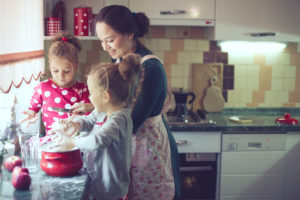The present of presence
By: Craig Dresang, CEO, YoloCares
The intoxicating aromas of fresh cut hay, bacon frying, cherry pipe tobacco and hot apple-walnut cake were synonymous with Mary Smith’s farmhouse.

She was a sturdy, happy-go-lucky woman with a generous personality and a booming embracing laugh. Her husband would frequently ask visiting children out to the barn to help with chores. After a while, Smith’s visiting nephews and nieces realized that their chores rarely involved the more pleasant duties like milking cows or feeding chickens. Instead, they usually found themselves shoveling manure or picking field rocks. Not surprising, it became much more appealing to stay in the house and help their aunt with one of her many baking endeavors.
Smith was in her 30s, with three spunky daughters; ages 5, 7 and 9, when she was first diagnosed with metastatic breast cancer. After weathering multiple, and mostly unsuccessful, rounds of chemotherapy, she began to think that her time was limited. The idea of seeing her little girls grow up to become women seemed further and further out of reach. The notion that she would not be around to soothe her daughters’ fears and anxieties, celebrate their future milestones and accomplishments, and bear witness to everything in-between, had sparked unfathomable psychological and spiritual pain for Smith.
It was November when her oncologist suggested that it might be time for hospice. “Christmas is right around the corner! I can’t do that to my family. Not now,” she firmly told her doctor. He respected her decision, but asked that she at least have the conversation with her husband and children. “They deserve to know the truth,” he told her. “And, they deserve the chance to be there for you . . . the way you have been there for them.”
As a promise to her longtime physician, Smith committed to having a candid conversation with her family. They decided together what the path forward should look like. As it turned out, the candor, honesty, and decision to explore hospice, was the one gift the entire family had been secretly hoping for.
Coming into hospice care two weeks before Christmas was hard, especially knowing that the holidays would not be filled with the usual hubbub of the season. Some cherished traditions would have to be skipped and the very definition of holiday togetherness would need to be redefined.
“Making the decision to be cared for at home was the best possible gift for my family,” Smith told her sister. “No one is wondering what is really happening here, because they all know. I’m allowing them to acknowledge reality and to be together in the safety of my own home, comfortable and at ease.” Instead of anticipating inevitable trips to the local emergency department and worrying about a possible hospitalization over the holidays, the whole family – including Smith’s parents, brothers, sisters and cousins – were able to be together in the home where so many happy memories live.
Feeling supported by her hospice team, Smith put together a list of gifts she wanted to purchase for her daughters’ future birthdays, Christmas celebrations, graduations and weddings. These were all milestones that she knew she would never live to see. She gave that list, along with a credit card, to her hospice volunteer and chaplain, and asked them to go on a shopping spree.
The team kicked into high gear and after a week of shopping they returned to Smith’s house with a stockpile of gifts and cards. Her hospice volunteer beautifully wrapped each item in an assortment of papers imprinted with pink and purple flowers, fleurs-de-lis, snowflakes and hearts.
Smith handwrote notes for each gift and lovingly tied them to the corresponding packages. When the shopping mission was complete, she said, “It is important to me that my girls know that I’m with them always, and that they see and experience my love for them … even when I’m not here.”
Her husband promised to hide the gifts in a corner of the attic and slowly bring them out for the girls as they lived through their own milestones and matured into women. Smith said, “They will know I love them, and even when my body is gone, they will see that my love for them is forever.”
————————————————
For Families:
The song, “There is No Place Like Home for the Holidays,” most commonly sung by old time crooners like Perry Como or Andy Williams, creates a feeling of coming home to a warm, full house during a festive season. No one wants to think about hospice when the holidays are approaching, but this is precisely when it should be considered. Hospice care can keep loved ones at home and in the thick of all the family activities while their pain and symptoms are expertly managed, improving quality of life. Hospice enables your loved one to be where they feel most comfortable: their home. From medical support and personal care to companionship, hospice brings peace of mind to patients and their families now and all through the year.
For Caregivers:
While the holiday season ushers in family traditions, the needs of your loved one with an end-stage illness do not take a holiday. As a caregiver, you can create a memorable time together without feeling overwhelmed. Here are a few ideas to help you navigate the holidays.
- Order takeout or delivery rather than cooking an elaborate meal.
- Scale back on gift-giving or forgo exchanging gifts.
- Cut back on activities that cause stress, watch holiday movies, take a car ride to look at lights, or play holiday music.
- Remember self care – avoid fatigue, remember to sleep, drink water, eat well, and move your body. Try to engage in a 15-minute walk.
- Ask for help – requesting help is a necessity any time of the year for caregivers, especially during holidays. Don’t hesitate to ask family or friends to step in, even a few hours can be a huge relief.
- Make memories – creating a memorable holiday season for your loved one is a gift to them and to yourself. Take a walk down memory lane with an old photo album, interact, and ask questions.
- Remember, the greatest gift you can give your loved one is your presence, understanding, and love during their final journey.
For more information regarding caregiver support or care for a loved one, visit www.yolocares.org.





Leave a Reply